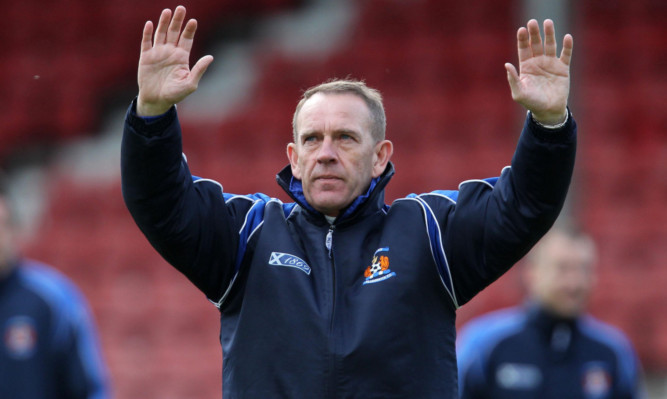
Out of sight, yet not out of mind.
Kilmarnock’s sacking of Kenny Shiels was one last cruel twist to a season that provided more than its share of brutality.
The move was met by fury from supporters who had relished the Northern Irishman’s determination to speak his mind no matter the cost and revelled in the club’s first-ever League Cup triumph a little over a year earlier.
Killie fans chief Sandy Armour reacted by criticising Rugby Park chairman Michael Johnston, for what he described as a “catastrophic decision.”
It appeared to owe more to Johnston’s sensitivities to off-field controversy than on-field performance, Killie having come within 20 seconds of making the top six.
However, just when 57-year-old Shiels had cause to be bitter he chose another route, arguing his sacking could in fact galvanise the club.
And in assessing the state of the Scottish game which has been further rocked by the news Hearts have gone into administration, he is typically thoughtful.
“I see more interest in justifying jobs than there is in the product in the pitch,” says the forthright Irishman.
“More interest in punishing managers for speaking their mind than focussing on what matters.
“There is a difference in the way teams in England, Scotland and Ireland see the game, and how the rest of the world views it. That needs to change. The game can’t be allowed to stagnate. To let that happen would do even more damage.
“For me the current set-up in Britain is simply not good enough. I hear a lot of talk about a lack of facilities, and all these kind of things. But in the UK we see a lot of the teams who are being trained rather than coached.”
It is an important distinction. Training provides fitness. Coaching provides education.
“Certainly, we have teams who go out and play with passion, commitment and drive,” continues the former Rugby Park manager.
“Yet at the same time there doesn’t seem to be a lot of structure in terms of play.
“The biggest thing is a lack of good quality players coming through. Scottish football just doesn’t get it in terms of developing young players.
“We need to do what Germany did in 1998. They were embarrassed by what France achieved at the World Cup, and responded by going and having a look at what their structures were and having a complete overhaul.
“I have been over many times and got a lot of my football education there. If a country that size can overhaul things, then so can Scotland.”
Shiels backs his argument with a specific example that grates on him.
“For SPL games, why do you have to have three players under 21 on the bench?” he said. That is just paying lip service to the principle of promoting talent.
“What is the possible benefit to the game of having young guys sat on a bench watching other people play?
“And we are talking about kids who are at a crucial stage of their football development.
“Talk to anyone in the game and they will tell you these kids need one thing above all else game time.”
To which end, Shiels has the most straightforward of solutions.
“I think the rule should be that three under-21 players should have to PLAY in each team. “That should be mandatory. The players would get experience, and there would be a great knock-on effect because three under-17s would then be promoted up to the under-20 squad.
“For me, it is a move that is essential for the improvement of Scottish football. I think it is also important to educate the players in terms of game awareness.”
It is a subject on which Shiels deserves to be taken seriously. When he arrived at Rugby Park, the club had no youth internationalists. Today they boast 15.
“What is going on at the Kilmarnock Academy is fantastic,” he said, absolving youth coach Alan Robertson of any blame for the situation he inherited.
“It is the one unblemished part of the football club. From under-7 to under-9, kids are brought through the same way, with a focus on enjoying their football and expressing themselves.
“Later, as I said, there is an emphasis on game awareness, which can make a big difference.
While Shiels is taking an enforced break just now, the development of star talent is likely to feature prominently in his future.
“I want to carry on working with young players and carry on managing,” he said. “Furthermore I want to improve in both areas. I would hope I will get the chance. In my career, I have won trophies with several different clubs Kilmarnock, Carrick Rangers, Coleraine and Tobermore United.
“I took Northern Ireland Under-17s to the European Championship finals in 2004, the smallest nation in history to qualify. Chairmen look to hire managers with that kind of profile.
“Kilmarnock did finish outside the top six this year, but we had seven players under 20 years old on the pitch and I am convinced the club is set up to have a great 2014-15 and 2015-16.
“I am open-minded about working in the UK or abroad. The fact is there are unlikely to be any opportunities of the type I am looking for until around September.
“Unfortunately you need jobs to become available, and for that to happen someone else has to get the sack.
“Jimmy Nicholl, of course, has pulled the trick off by picking up a position with Hibs and I was delighted for him. I had felt very conscious that I took him away from a job at Cowdenbeath to bring him to Rugby Park.”
It is a sentiment that Shiels’ record would suggest will be reciprocated before too long.

Enjoy the convenience of having The Sunday Post delivered as a digital ePaper straight to your smartphone, tablet or computer.
Subscribe for only £5.49 a month and enjoy all the benefits of the printed paper as a digital replica.
Subscribe